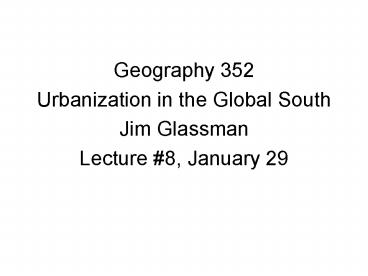Geography 352
1 / 15
Title: Geography 352
1
- Geography 352
- Urbanization in the Global South
- Jim Glassman
- Lecture 8, January 29
2
(No Transcript)
3
World systems theory as a form of neo-Marxism
- Politics and economics inseparable (view shared
by all Marxists) - Uneven development is rule (view shared by all
Marxists) - Class is important, but spatial expression of
class structures is crucial position of class
struggles in world system mediates their
significance and effects (view especially
developed by neo-Marxists)
4
Source Francois Bourguignon and Christian
Morrisson, Inequality Among World Citizens
1820-1992, American Economic Review 92, 4
(September) 727-744.
5
Source Francois Bourguignon and Christian
Morrisson, Inequality Among World Citizens
1820-1992, American Economic Review 92, 4
(September) 727-744.
6
The historical context of world systems theory
- Immanuel Wallerstein
- Influence by dependency theory
- Historical studies of development in Africa, then
in Europe-centered world system - The upheavals of 1968
7
1968 Upheavals against anti-systemic movements
in power
- First World social democratic states
- US civil rights, counter-culture, Vietnam War
- France protests against French state
- Second World revolutionary states
- Czechoslovakia USSR crushes uprising
- China ongoing Cultural Revolution
- Third World nationalist states
- Mexico Olympics protests and massacre
- China ongoing Cultural Revolution
8
Transformations in the world system
- Increased TNC activity to counter declining
profits (1960s-70s) - Breakdown of Bretton-Woods system (1970s)
- Rise of East Asian NICs (1970s)
9
Major world systems arguments
- World system comprised of global economy,
territorial states - World system hierarchical but positions of
individual states within system are not static - World system has tripartite structure
10
World system comprised of global economy,
territorial states
- Global commodity chains
- Capitalism inherently global, since 1492
- Appropriate unit of analysis is world system
- Territorial states
- Political control exercised by territorial states
- Advantages to capitalists (playing off states)
- Limits for anti-systemic movements in power
- Nationalism as ideological (mis)representation of
power
11
World system hierarchical but... state positions
not static
- Core-periphery structure and dependency
- Stagnationist thesis incorrect
- Movement up and down hierarchy by individual
states is possible - Loosely-structured zero-sum game fallacy of
composition - Mobility helps maintain system as a whole
- Trajectories of states are determined by world
system not merely by states themselves
12
(No Transcript)
13
Tripartite structure
- Core areas
- Preponderance of higher value, higher technology
production activities - Preponderance of higher wage jobs
- Peripheral areas
- Preponderance of lower value, lower technology
production activities - Preponderance of lower wage jobs
- Semi-peripheral areas
- Mix of core and peripheral activities
- Ideologically important buffer zone
14
World systems approaches to urbanization in the
Global South
- General structure of world system enables and
constrains urbanization process - Importance of geographical-historical legacies
- Primacy common outside core but not prevalent
everywhere (e.g., Nigeria) - Specific local situations cannot be deduced from
position in world system or region - E.g., different semi-peripheral cases (Nigeria
vs. South Korea) - E.g., different cases in same region (Thailand,
South Korea)
15
Social basis of Marxism and neo-Marxism today
- Post-revolutionary, reformist politics
- Constituents for Marxist reformism
- Labor organizations social democratic parties
- Progressive actors within the state
- Constituents for neo-Marxist reformism
- Progressive actors in the Global South?
- Anti-corporate globalization activists?































